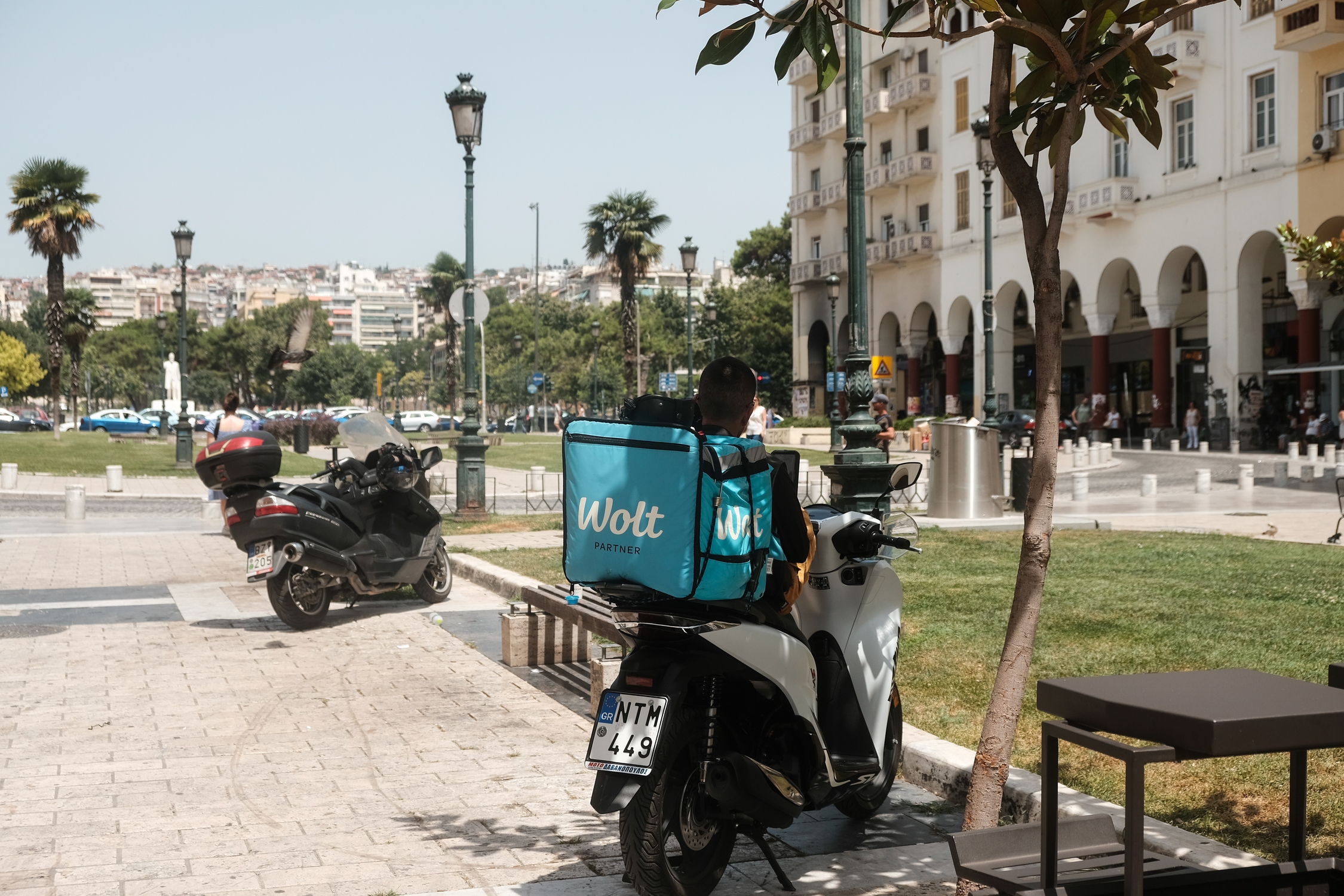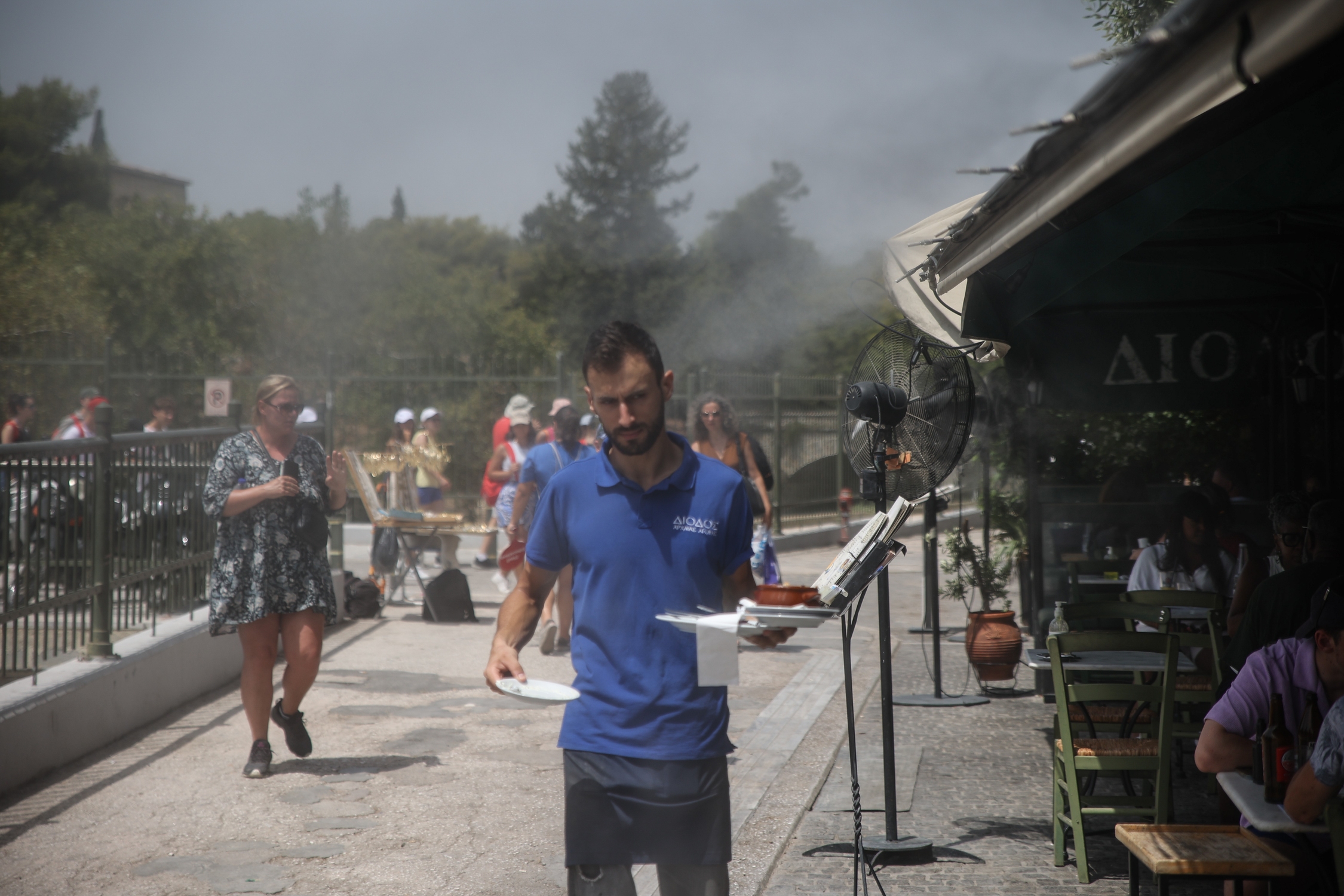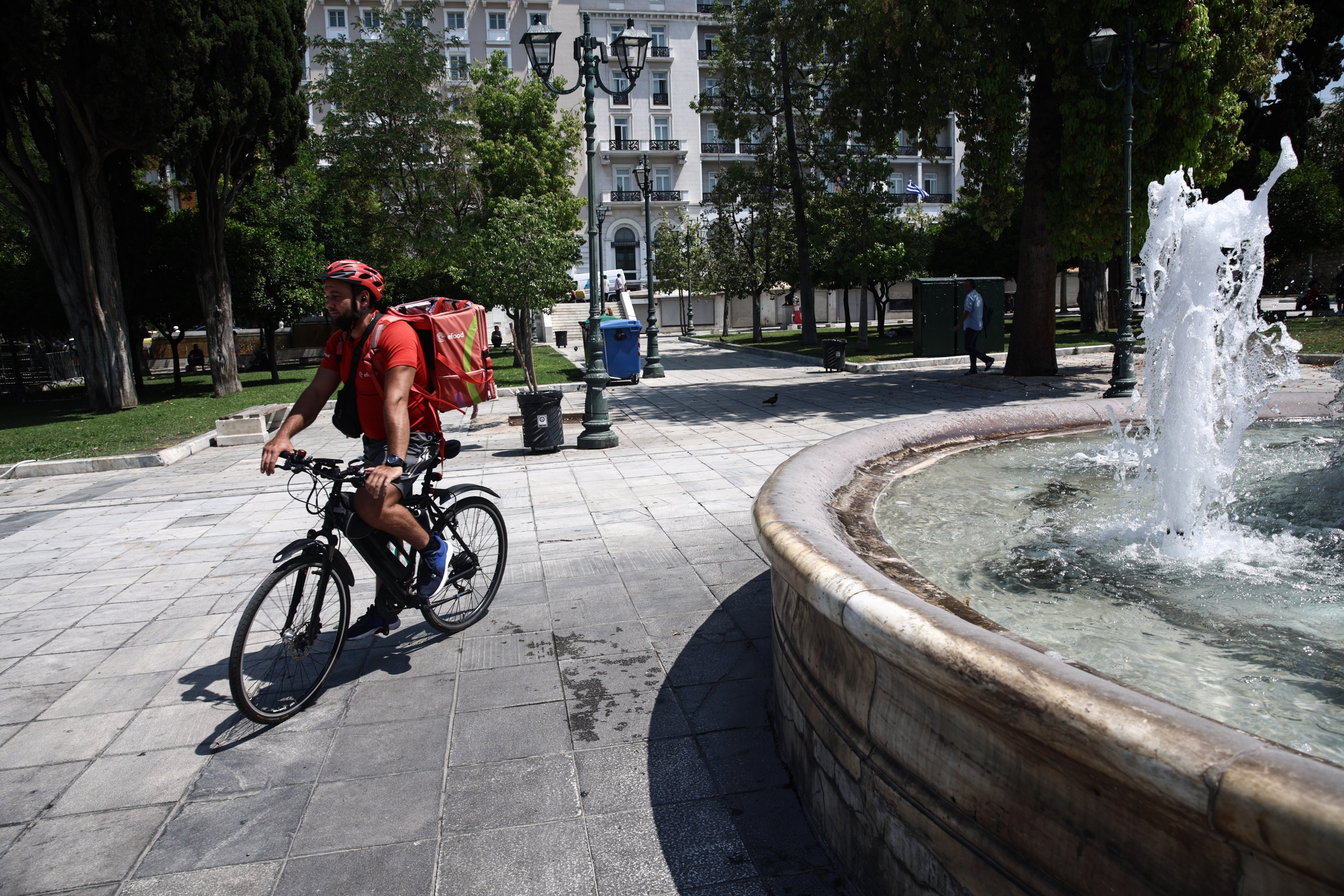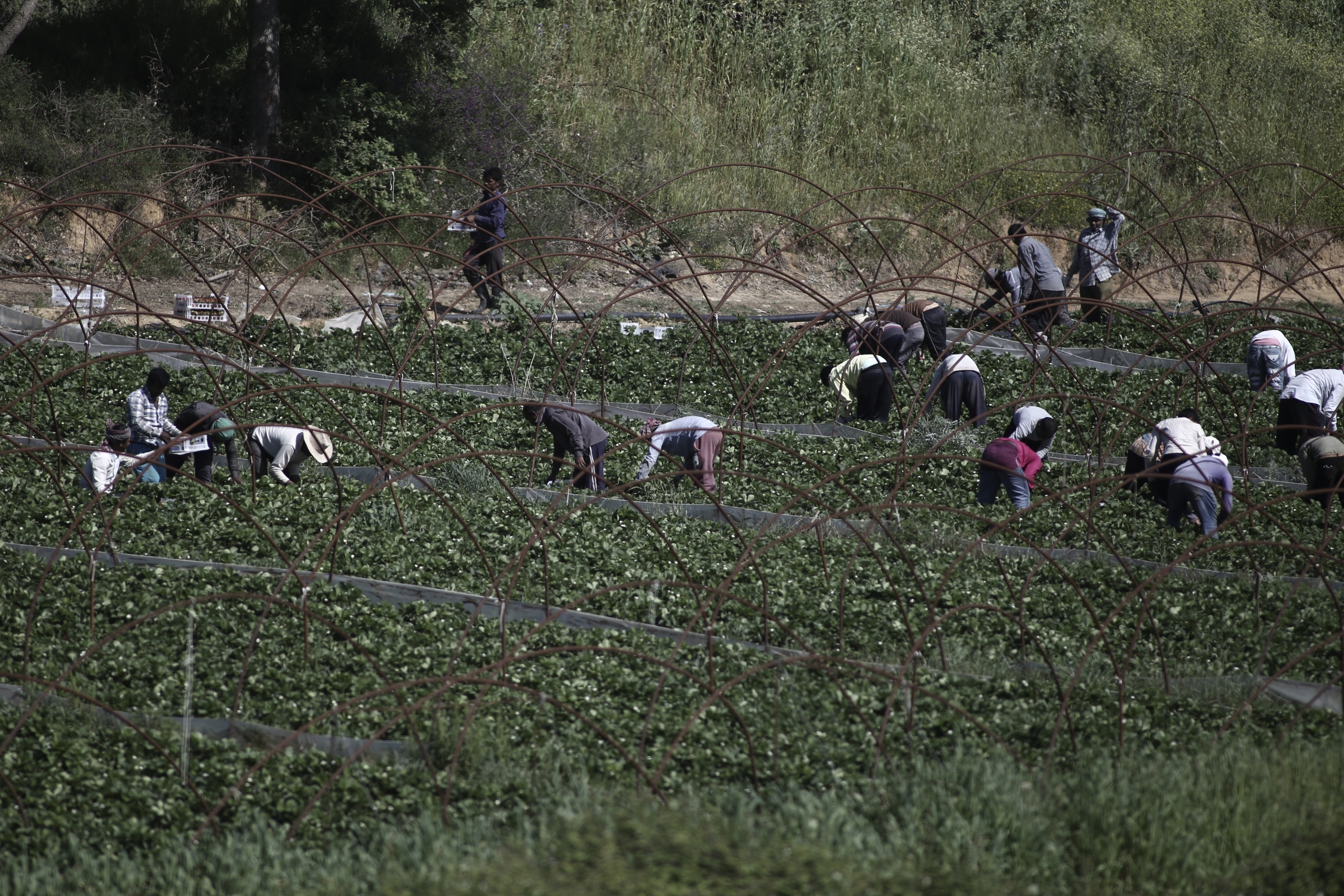The struggle for water
Michalis Rentzios dons his red vest and mounts his motorcycle, ready for an eight-hour shift delivering orders. June has arrived, and scientists warn of another summer of prolonged heat waves caused by the climate crisis. Rentzios and his colleagues are anxious.
“You feel like your hands are being burned with a torch, you’re completely dehydrated, and it’s hard to breathe. This is what delivering in the heat feels like,” says the 59-year-old efood delivery man. efood, along with Wolt, are the two leading players in the digital delivery economy in Greece. “When you work on online platforms, your workplace is the road. Where can you go when you have no orders? Where can you stop to take a break?”
“The water in our bottles gets boiling hot, but we have to drink it because where else can we get a drink? It is financially impossible to buy fresh water every half hour, and the company does not offer us free water.” Thousands of delivery people across the globe face the same struggle for water and shade to survive.
The Paraguay experiment
“Offer a bottle of water to your delivery man.” This unexpected slogan echoed through Paraguay in January 2022. It was the anguished cry of motorcycle delivery workers enduring an unprecedented heat wave, labouring in temperatures of 41.5°C in the shade.
“During the pandemic, we helped contain the virus. Now we are facing death because of the heat. Support our right to decent work. Only solidarity can save us as the state is indifferent to our plight,” urged Sinactram, the national union, rallying consumers.
Inspired by this call, a group of local journalists conducted an experiment to measure the environmental and physical work conditions of delivery workers. They translated scientific data into labour rights claims.
Leading this experiment was Andreas Flouris, a renowned scientist and professor of Physiology at the University of Thessaly. How did a Greek find himself at the forefront of this investigation?
Andreas Flouris is a global authority on the climate crisis and its impact on workers’ health and vulnerable groups, such as pregnant women. He advises governments and international organisations, including the World Health Organisation and the International Labour Organisation, on the effects of heat on health and the economy. Flouris established Greece’s first Environmental Physiology laboratory, where simulations of extreme environmental conditions on humans are conducted. In 2023, Flouris became the first Greek scientist to be included in TIME Magazine’s list of the 100 most influential people in the world for his contributions to labour rights during the climate crisis.
Flouris advised the journalists from elsurti.com on the acquisition of special equipment for the experiment, and so it began.

“The experiment concerns us greatly. Greece has it much worse than Paraguay”
“Our goal was to understand the worker needs through scientific data,” explains Professor Andreas Flouris. “We measured the ambient temperature, humidity, solar radiation, and the body temperature of the delivery workers. We also used questionnaires to ask about symptoms and health emergencies.”
Workers frequently reported dizziness, hyperthermia, and heatstroke. Many didn’t know how to assess their symptoms, and few had the “luxury” of visiting the hospital.
“They reported many symptoms indicative of thermal injuries: cramps, headaches, dizziness, increased heart rate, and severe weakness. These symptoms were responsible for many traffic accidents among delivery workers,” emphasises Flouris.
“When someone drives a motorcycle in the heat, it’s like having a hair dryer constantly blowing hot air on them,” he compares. Their reflexes get impaired, and they lose balance, often rushing through red lights out of desperation.
The World Health Organisation and the International Labour Organisation set a limit of 38°C for body temperature during work. Beyond this limit, physical and cognitive functions weaken, and the risk of thermal injuries rises dangerously. At 40.6°C, there is a serious risk of death.
In Paraguay, delivery workers often lost days’ wages due to feeling unwell. They would rest for a day but were forced back to work the next. “With such demanding schedules and working conditions, our bodies don’t have time to recover,” warns Flouris. “When someone works three days in a row in the heat, the accumulated strain doubles the risk of thermal injuries by the fourth day. Resting an afternoon at home is not enough; the strain is too great.”
But why does the experiment in Paraguay concern us? Are there similarities with Greece?
“It concerns us a lot,” Flouris clarifies. “The climate in Greece is very similar to that of Paraguay. In fact, the temperatures and the THYMVAS index (a function of temperature, solar radiation, humidity, and wind) we recorded in Paraguay were often much lower than those we record in Athens during the summer. Therefore, it should not only concern us but alarm us.”
Delivery in Greece: Online platforms fail to provide rest and sanitary areas for their workers
Can we imagine taking our office outside and working under the hot sun? Now, think of a delivery person on a scorching day, wearing a helmet and navigating through traffic. Or a cyclist carrying a heavy bag on their back.
Vassilis Stylos turned to delivery work at age 51 after losing his job due to COVID-19. He endured last year’s “Kleon” heat wave, the most extreme ever recorded in Greece, while working on the road.
Stylos recalls the immense challenges he and his colleagues faced working for online platforms. “We badly needed breaks and a shady place. I remember colleagues constantly sending messages asking to leave work for 15-20 minutes because they felt dizzy,” says Vassilis Stylos, former president of the efood workers’ union.
The Athens environment, dominated by concrete structures, exacerbates the situation. Buildings and asphalt absorb heat during the day and release it at night, keeping temperatures high. The World Health Organisation recommends 9 square meters of greenery per inhabitant, but Athens has only 0.96 square meters per inhabitant.
Delivery workers have had to invent ways to cope. “We were forced to come up with our own solutions. We’d sit inside a café or an apartment building to cool off,” Stylos explains. “But in reality, you can’t do much because the app pressures you to meet deadlines.”
In Paraguay, delivery workers from a major online platform successfully lobbied for agreements with gas stations to provide hydration, shade, phone charging, and toilet facilities.
In Greece, online delivery companies do not consistently provide resting and sanitary facilities. This means that delivery workers, during their eight-hour shifts in winter and summer, do not have access to sheltered areas.

Workers’ pressing needs and company responses
The primary demand of the efood workers’ union is access to resting areas. It’s important to note that Wolt, unlike efood, does not have an employee union as it only partners with self-employed workers. Together, efood and Wolt employ over 12,500 delivery workers, a number that continues to grow along with their profits
ThePressProject contacted both companies via email to ask if they would consider providing necessary service spaces for their delivery people. Wolt replied, “During the period of extreme weather and high temperatures last year, our air-conditioned warehouse in Athens was open for anyone who wanted to take a break,” and stated that they would reconsider this possibility again this year. However, a Wolt delivery man pointed out that the warehouse’s location in the Neos Kosmos district only helps if you’re very close by; otherwise, “we’re left exposed.”
efood did not respond to this specific question. When asked about measures they plan to implement this summer, both companies stated that “the safety of their employees/partners is a priority” and that they will comply with the recommendations of the Ministry of Labour, though they currently “do not have any update.”
Wolt mentioned that last year “delivery workers who belong to vulnerable groups or felt discomfort were advised to stop deliveries during hours when the temperature exceeded 40°C.”
Dimitris Christodoulellis, a 28-year-old Wolt delivery man, shared his concerns. As an independent partner paid by the order, he feels stressed about coping with the heat. “On rainy days, Wolt would raise our pay to encourage us to go out more. They would give us, for example, €8 extra for 10 orders. If they do the same during the heat wave, it will be a double-edged sword.”
“The amount I make per order depends on the mileage. The further I go, the more I get paid. I’ve installed a plastic shield on my bike to deflect the wind and I wear long sleeves and trousers to avoid burns. I can’t afford to feel sick because my earnings will drop to zero.”
efood told ThePressProject, “We provide training for emergency weather conditions and have an emergency button for instances of danger or feeling unwell. Delivery workers have the freedom to stop working when they feel unwell or concerned about working conditions.” They also mentioned expanding breaks and increasing their frequency, adding, “every employee has the right to extend their break in cases of illness (within a certain limit) without salary deductions.”
However, both efood delivery men ThePressProject spoke to—former union president Vassilis Stylos and union secretary Michalis Rentzios—said that any extended break or emergency shift interruption due to illness is deducted from their monthly salary. “This is inhumane and very oppressive,” said Stylos, who recently decided to quit delivery work for good. efood did not respond to a request for clarification.
“We haven’t heard anything about our breaks being prolonged or increasing their frequency in view of the heat wave. Our union has requested this and I hope they implement it,” says acting union secretary Rentzios.
The union’s third demand is an automatic suspension of deliveries on online platforms when temperatures fall below 5°C or rise above 38°C. Discussions between delivery workers and efood on this issue are ongoing.
The final critical demand of the efood union is access to free, cool water.
Both companies stated to ThePressProject that on days of high temperatures, they provided free water to their employees/partners.
“efood only provided us with free water in the summer of ’22,” says the union secretary. “During the heatwave of ’23, we did not have this option because the app was closed. However, the app was closed for only two days due to an emergency ministerial decision, while the heatwave lasted for two weeks.”

Workers’ demands align with scientific recommendations – Greece lacks protective legislation
In an era of climate crisis and extreme heat, workers need permanent and uninterrupted legislative protection. Companies may promote “the safety of their employees,” but what is the real situation?
The preventive protection measures demanded by workers are entirely consistent with international scientific recommendations.
“Constant hydration is crucial. Workers need free and readily available water, as distance is a discouraging factor. They also require protective, lightweight clothing, which employers must provide for low-wage workers. Employers should identify vulnerable groups, such as pregnant women, not to stigmatise them, but to ensure their protection. Workers need very frequent breaks in shaded areas, ranging from 10 to 30 minutes every hour. At the start of summer, workers should be educated on recognising thermal injuries and administering first aid. The most extreme measure is suspending work,” explains Flouris.
These measures have been submitted to the Ministry of Labour by a technical group, which includes Flouris, alongside representatives of workers, employers, doctors, and labour inspectors. Nevertheless, Greece remains one of the few countries in Southern Europe without relevant legislation.
Institutional gaps and the need for comprehensive legislation
ThePressProject sent questions to the Department of Labour. The response was that “a draft ministerial decision on the protection of workers from thermal stress is being processed and is expected to be published soon.”
However, ad hoc ministerial decisions do not fully address the need for modern legislation in response to changing climate conditions. “For a country in Southern Europe, we have no awareness of how critical this issue is. Spain and Italy have enacted laws, while Cyprus has done so since 2012. Here, workers are not protected,” Flouris emphasises.
Delivery workers confirm their insecurity in the absence of institutional protection. “I feel completely unprotected by the state. Last year, for the first time, the ministry issued a mandatory suspension of deliveries for two days. While this was a positive step, we had to be on the streets as a union to ensure the measure was implemented and to call the police when it was violated,” says Rentzios. “During the remaining days of the heatwave, no relief measures were imposed.”
Economic and health benefits from compliance
Research by Flouris for the Bank of Greece indicates that compliance with these measures will also bring significant financial benefits. “Greece is currently losing 3.1 billion euros per year due to lost productivity from heat. Within the next 25 years, the cost could reach 10 billion euros per year.”
“We have found that for every €1 that companies invest in preventive measures for heat stress, they get back €2-€20 in reduced lost productivity.”

The climate crisis hits the most vulnerable
Heat is responsible for millions of occupational accidents and thousands of deaths worldwide. In Greece alone, illnesses and accidents attributed to occupational heat stress are estimated at 1,500 annually, excluding chronic conditions from prolonged heat exposure, such as chronic kidney disease. Frequently, when a worker collapses at home, the incident is disconnected from their work environment and merely recorded as a simple interruption.
During last year’s heatwave, a 46-year-old delivery man, working without a contract at a grill house, died from “cardiorespiratory arrest after exposure to very high temperature.” Delivery workers remember such news vividly, recognising themselves in their fallen colleague.
Global warming disproportionately affects the most vulnerable and low-paid workers. It impacts 2.5 billion workers worldwide, including those in agriculture, tourism, delivery, rubbish disposal, and construction. These workers have little ability to adjust their working conditions, cannot work remotely, or shift to cooler hours. They often lack the luxury of time for self-care and are frequently immigrants who struggle to access the health system.
While delivery workers in Paraguay appealed to consumer solidarity, and Greeks might consider the individual responsibility of “not ordering” during extreme weather, workers also need robust legislative protection. This includes providing information and raising awareness for employers and establishing a strong inspection body to ensure corporate compliance.
The future of work must include rights and protections for workers
The future of work must include rights and protections for workers. Without these, how sustainable will it truly be?